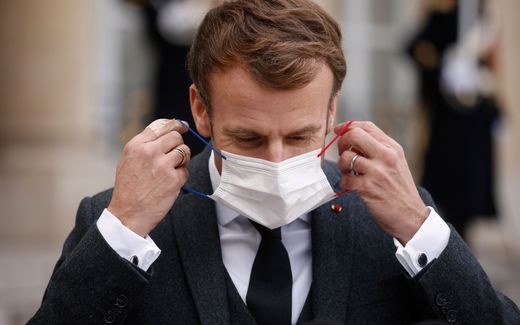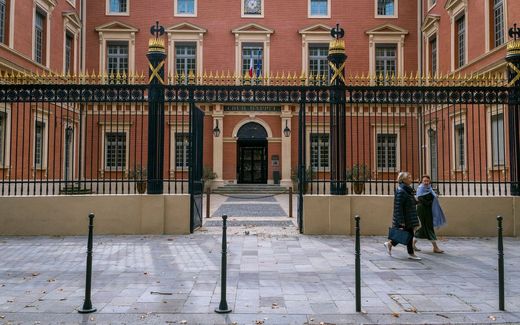French presidential candidates on the end of life

Photo AFP, Philippe Lopez
Western Europe
France will elect a president in April. Who are the primary challengers of the incumbent head of state Emmanuel Macron? And what are the candidates’ views on euthanasia and assisted suicide?
In 2017, Emmanuel Macron and his movement ‘La République en Marche’ won the second round of voting against the right-wing nationalist Marine Le Pen. After five years under François Hollande of the Socialist Party, which were considered years of stagnation, Macron then filled the political vacuum that had arisen from the discord within the major parties with his completely new ‘movement’.
Main candidates
The incumbent President is considered the most promising candidate for re-election, when on 10 April, the first round of the presidential elections will take place. In the polls, with about 30 per cent of the vote, he is far ahead of candidates such as Marine Le Pen (17 per cent), the left-populist Jean-Luc Mélenchon (12 per cent) and the ‘green’ candidate Yannick Jadot (6 per cent).

Experts think the election campaign will occur in the right-wing political camp unless the political left agrees on a joint candidate. Marine Le Pen, who presents herself with a more pro-European and tolerant profile, is considered one of the most promising opposing candidates. However, she is under pressure from the right-wing populist Eric Zemmour, who has 12 per cent in the polls.
Valérie Pécresse is the first woman running in the centre-right party ‘Les Républicains’ election campaign. Her issues are security, a conservative stance on illegal migration and an economically strong Europe with its own cultural identity. In the polls, she does not get more than 12 per cent of the vote.
Issues
The significant issues of security, social justice, energy, the environment and the economy are being played out in the election campaign. But also the handling of immigration, integration and the so-called minorities under the ideal principle of freedom, equality and fraternity.
Medical-ethical issues are not high on the agenda. However, this does not mean that they are absent. One of the topics that may come back to the fore during the President’s next term of office is life termination. Certainly not after a debate in the French parliament on the introduction of euthanasia in April 2021 was nipped in the bud.
In France, the Léonetti law of 2005 is in force. While it prohibits the principle of the so-called “acharnement thérapeutique” –the unrestricted continuation of medical treatment– it also prohibits active euthanasia, which is equated to manslaughter, punishable by 3 to 5 years imprisonment and a fine of 45,000 to 75,000 euros. The law only allows a patient to be placed under deep sedation leading to death.
Euthanasia
In March last year, Olivier Falorni, a deputy from a splinter party in the French parliament, tabled a bill to make euthanasia possible in France, Dutch Reformatorisch Dagblad wrote at the time. The MP pointed to French citizens who travelled to countries such as Belgium and Switzerland for help with suicide, while doctors in France are estimated to carry out euthanasia 2,000 to 4,000 times a year in secret.

Falorni proposed that any adult of sound mind who is in the terminal phase of a severe and untreatable illness should be able to ask for “medical assistance” to die “with active help”.
The bill was not passed because opponents submitted 4,000 amendments against it, which made a substantive discussion of the legislative proposal impossible, franceinfo reported. The rules stipulate that a legislative proposal not submitted by the government but by an individual member of parliament must be dealt with within one day – which, with so many amendments, was practically impossible.
Palliative care
Although the government did not comment on the bill’s content at the time, it became clear that most of the deputies from Macron’s ruling party supported the law. If this does not change after the elections, the topic could be back on the parliamentary agenda. For the French website Famille chrétienne, this was reason enough to find out what the most prominent presidential candidates think about the subject of termination of life.
Marine Le Pen, likely to be the incumbent’s opponent in the second round on 24 April, is “totally opposed to the legalisation of euthanasia”. She considers that the Léonetti law is a balance to be maintained. “My opposition to euthanasia and assisted suicide does not depend on the polls,” she adds. According to the right-wing candidate, there is still a world to be won in the field of palliative care.

This is also the opinion of her great rival on the right. “I believe that we must get out of what I would call the “suffer or die” trap, Eric Zemmour says. “The dignity of patients cannot be negotiated; it does not depend on their autonomy or their state of consciousness. Otherwise, the door is open to all kinds of abuses.” The populist politician unequivocally states: “I do not want to legalise euthanasia, and I want to do everything possible to relieve pain.”
For the centre-right Valérie Pécresse, euthanasia is “not my vision of human dignity”. The Catholic mother of two is “not in favour of changing the law.” Her priority is to make the Léonetti law applicable before considering anything. “It is already a law that allows for assisted dying”, Pécresse continues, referring to terminal sedation provided for by the law. “However, only 30 per cent of French people have access to it. The priority must be to develop a palliative culture throughout France, especially palliative care at home.”
Humanist freedom
On the left side, the self-proclaimed “proponent of legalising assisted suicide” Jean-Luc Mélenchon does “not intend, as President of the Republic, to promote assisted suicide”. The left-wing populist proposes “to create a right, a freedom that is strictly and very intimately personal. From then on, everyone can maintain and implement their own principles.” According to Mélenchon, to “spare others the contagion of one’s own suffering is a unique proof of love”. He adds that “recognising a right is in no way tantamount to obliging anyone, nor to promoting this act. Humanist freedom is never a threat to anyone.”

From “a legislative point of view”, Yannick Jadot is “in favour of a step forward” from the existing laws to “facilitate” euthanasia. “It remains a choice of life, even if it is death.” For the environmental politician, it does not apply to assisted suicide. “This gesture has nothing to do with an inevitable end of life that we wish to alleviate. At this stage, we should not open these debates”, Jadot says. Like the other candidates, he is also favouring improving palliative care.
For the article, Famille Chrétienne did not speak to President Macron. However, in a recent book interview, the outgoing President briefly outlined his position on the end of life. “On euthanasia, I recalled that I was in favour of applying the law and reducing suffering. Should we go further?” the President asked. “I believe that this intimate subject, which affects each of us, is civilisational and therefore deserves a comprehensive debate, which politicians must not capture”, added Macron, who was baptised a Catholic at his request when he entered a Jesuit school at the age of twelve.
Related Articles






